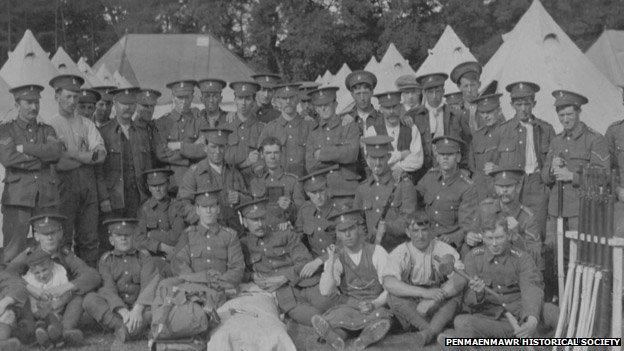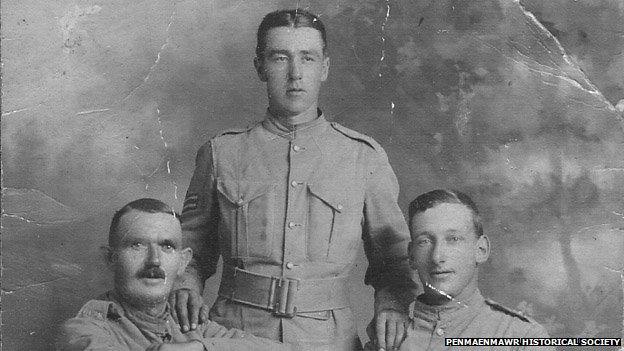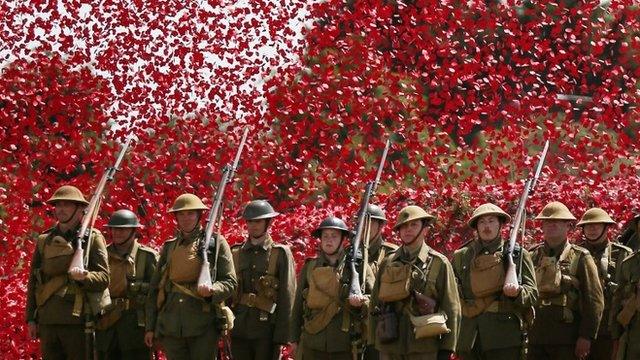WW1: The rise and fall of the Penmaenmawr Quarry Boys
- Published

F Group of the 6th Battalion prior to final training before sailing to Alexandria and Gallipoli
They grew up together, worked together, and in a single day at Gallipoli a century ago, many of the quarrymen of Penmaenmawr died together.
The story of the Penmaenmawr Quarry Boys is typical of the north Wales towns and villages who sent their men to fight in WWI.
Inspired by quarry chairman Lt Col Charles Henry Darbishire, the men of the Penmaenmawr & Welsh Granite Company had already been volunteering for their own territorial unit, long before war broke out.
Despite his protests and being in his 70s, Lt Col Darbishire was deemed too old to fight alongside his men.
But with his encouragement, in August 1914 at least 113 of the Quarry Boys rushed to sign up for the Penmaenmawr Company of the 6th Battalion, Royal Welsh Fusiliers.
Almost exactly a year later, many of them would die in action when they landed on the beaches of Turkey's Suvla Bay.
Swansea University's Word War One expert Dr Gerry Oram explains that by the time they arrived, the Gallipoli Campaign had already been raging for over three months.
"The Gallipoli Peninsula was key, as whoever controlled it controlled the Dardanelles straights, and the route to supply Russia via the Black Sea," Dr Oram said.
"But the Allies had vastly underestimated the will of the Ottomans, who were generally regarded as the 'Sick Men of Europe'.
'Gunboat diplomacy'
"When old fashioned gunboat diplomacy failed, on 25 April 1915 the Allies adopted another traditional British tactic, an amphibious landing - which did manage to gain a toe-hold on the beaches.
"However, these small gains came at an astronomical cost - even by the standards of the first world war - as Turkish and German machine-guns and artillery controlled the high ground overlooking the landing sites."
It was into the teeth of this bombardment that the Penmaenmawr Quarry Boys landed on 9 August 1915.
After just one night sheltered near "C" beach, and after a breakfast of tea and hard tack biscuits, the Quarry Boys received orders to advance across a dried-up salt lake to attack Scimitar Hill.
Historian Anne Pedley says that not even in their worst nightmares could they have known what they were about to march into.
"They'd had three weeks at sea, seeing places and things they could only have dreamt about," she said.
"It must have seemed like an adventure, until they were called into battle and found themselves marching with a full pack across the great salt lake, sinking up to their calves in ooze and being torn apart by machinegun fire from above.
"By that night - in the space of one day - the Penmaenmawr Company simply didn't exist anymore."
By the autumn the campaign had faltered into stalemate.

Three survivors of the Gallipoli campaign pose at a studio in Alexandria 1916
Dr Oram stresses, however, that the terrible hardship did not end there.
"The Ottomans fought tenaciously to prevent the Allies breaking out of the beachhead. Eventually the Allies were also worn down by dysentery and thirst," he said.
"Then, in November, came a terrible storm. Trenches dug into the sand flooded and collapsed, and the battalion diary records 'the flood is up to two to four foot deep in front of trenches… with the enemy apparently in a worse position as men's dead bodies floated down on the flood'.
"After that came a freeze. One newspaper report described how 'Sentries who had been watching at the loopholes of the trench parapets were found dead at their posts. The bodies were frozen, and their rigid fingers were still clutching their rifles'.
'Spectacular disaster'
"By December it was obvious that Gallipoli had been a spectacular disaster, and attention turned to what was, ironically, a textbook evacuation."
The remnants of the Penmaenmawr Quarry boys went on to fight in Palestine, and finished the war in Jerusalem.
But Ms Pedley says the memory of that day in August 1915 continued to cast a long shadow for many years to come.
"Families were dependent on the quarry for not only their living, but also their housing and their sense of identity," she said.
"The shared trauma for the men who did come home left a divide between those who had experienced Gallipoli and others who couldn't even imagine what the survivors had been through."
- Published16 August 2014
- Published5 August 2014
